有关看病的英文表达方法
看病的英语短语和词汇
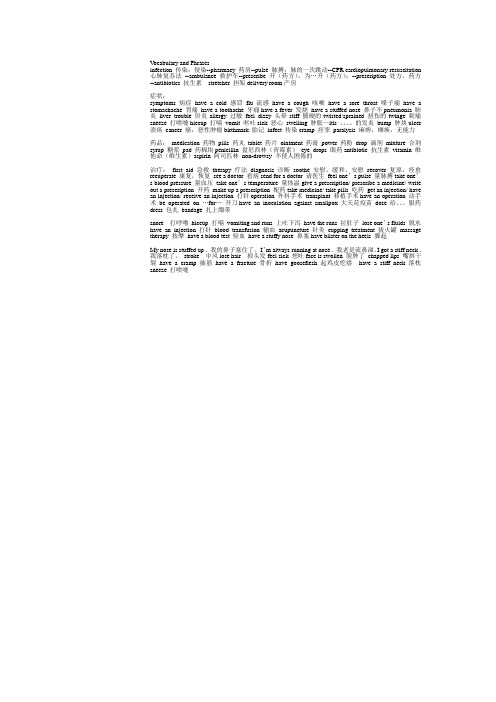
V ocabulary and Phrasesinfection 传染;侵染--pharmacy 药房--pulse 脉搏;脉的一次跳动--CPR cardiopulmonary resuscitation 心肺复苏法--ambulance 救护车--prescribe 开(药方),为…开(药方);--prescription 处方,药方--antibiotics 抗生素stretcher 担架delivery room产房症状:symptoms 病症have a cold 感冒flu 流感have a cough 咳嗽have a sore throat 嗓子痛have a stomachache 胃痛have a toothache 牙痛have a fever 发烧have a stuffed nose 鼻子不pneumonia 肺炎liver trouble 肝炎allergy 过敏feel dizzy 头晕stiff 僵硬的twisted/sprained 扭伤的twinge 刺痛sneeze 打喷嚏hiccup 打嗝vomit 呕吐sick 恶心swelling 肿胀—itis 。
的发炎bump 肿块ulcer 溃疡cancer 癌,恶性肿瘤birthmark 胎记infect 传染cramp 痉挛paralysis 麻痹,瘫痪,无能力药品:medication 药物pills 药丸tablet 药片ointment 药膏power 药粉drop 滴剂mixture 合剂syrup 糖浆pad 药棉块penicillin 盘尼西林(青霉素)eye drops 眼药antibiotic 抗生素vitamin 维他命(维生素)aspirin 阿司匹林non-drowsy 不使人困倦的治疗:first aid 急救therapy 疗法diagnosis 诊断soothe 安慰,缓和,安慰recover 复原,痊愈recuperate 康复,恢复see a doctor 看病send for a doctor 请医生feel one’s pulse 量脉搏take one’s blood pressure 量血压take one’s temperature 量体温give a prescription/ prescribe a medicine/ write out a prescription 开药make up a prescription 配药take medicine/ take pills 吃药get an injection/ have an injection/ receive an injection 打针operation 外科手术transplant 移植手术have an operation 动手术be operated on …for…开刀have an inoculation against smallpox 大天花疫苗dose 给。
生病看病时常用英语口语

医生英语口语1、Whats the matter?什么事?2、Whats your complaint?什么病?3、What can I do for you?我能效劳什么?4、Is there anything wrong?有什么不对劲吗?5、What exactly is wrong?到底有什么不对劲呢?What symptoms do you have?你有什么症状?Is there anything particularly unusual?有什么特别不一样的吗?Whats the trouble?什么毛病?When did it happen?是什么时候发生的?Since when has it hurt?受伤多久了?11、Since when?从什么时候?When did this start?从什么时候开始的?13、When did you start having this problem?你从什么时候开始有这毛病的?14、When did this trouble start?这毛病是从什么时候开始的?15、How long has it been bothering you?这困扰你有多久了?16、Do you have a fever?你发烧吗?17、Do you have a cold?你着凉了吗?18、Do you have severe headaches?你头痛得厉害吗?19、Do you have a sore throat?你喉咙痛吗?20、Do you feel chilly?你觉得冷吗?21、Do you feel nauseous?你想吐吗?22、Do you have diarrhea?你拉痢疾吗?23、Have you ever coughed up blood or bloody phlegm?你曾咳出血或痰中带血吗?24、Have you passed blood in your urine?你小便带血吗?25、Are you taking any medicine regularly?你通常吃什么药吗?26、Do you have any allergies?你有什么过敏反应吗?27、How is your appetite?你食欲如何?28、Do you often drink alcohol?你常喝酒吗?29、Can you walk?你能走路吗?生病看病时常用英语口语1、i'm not feeling well.我觉得不舒服。
“看病”你只会说“gotohospital”?看老外真正用的9句英语口语!
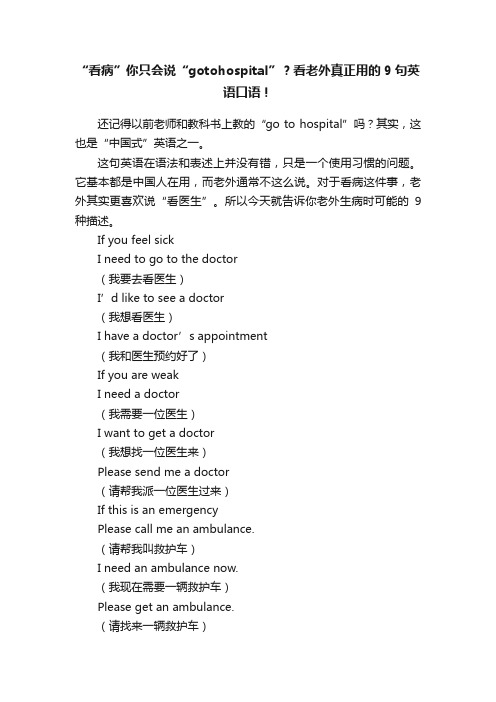
“看病”你只会说“gotohospital”?看老外真正用的9句英
语口语!
还记得以前老师和教科书上教的“go to hospital”吗?其实,这也是“中国式”英语之一。
这句英语在语法和表述上并没有错,只是一个使用习惯的问题。
它基本都是中国人在用,而老外通常不这么说。
对于看病这件事,老外其实更喜欢说“看医生”。
所以今天就告诉你老外生病时可能的9种描述。
If you feel sick
I need to go to the doctor
(我要去看医生)
I’d like to see a doctor
(我想看医生)
I have a doctor’s appointment
(我和医生预约好了)
If you are weak
I need a doctor
(我需要一位医生)
I want to get a doctor
(我想找一位医生来)
Please send me a doctor
(请帮我派一位医生过来)
If this is an emergency
Please call me an ambulance.
(请帮我叫救护车)
I need an ambulance now.
(我现在需要一辆救护车)
Please get an ambulance.
(请找来一辆救护车)。
关于看病的英语口语中英对照
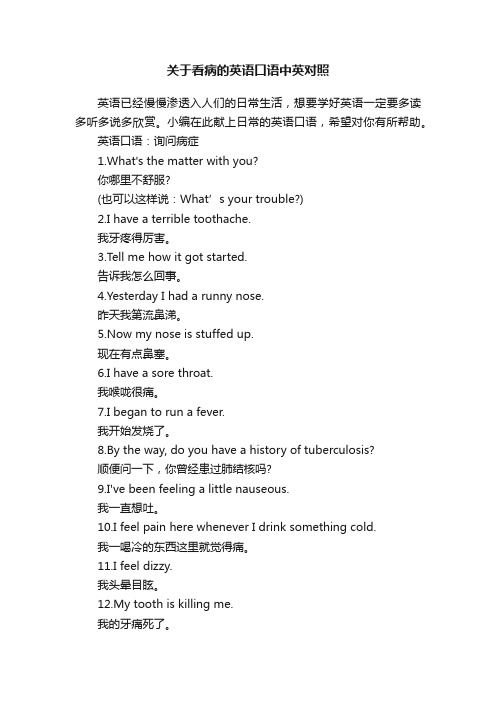
关于看病的英语口语中英对照英语已经慢慢渗透入人们的日常生活,想要学好英语一定要多读多听多说多欣赏。
小编在此献上日常的英语口语,希望对你有所帮助。
英语口语:询问病症1.What's the matter with you?你哪里不舒服?(也可以这样说:What’s your trouble?)2.I have a terrible toothache.我牙疼得厉害。
3.Tell me how it got started.告诉我怎么回事。
4.Yesterday I had a runny nose.昨天我第流鼻涕。
5.Now my nose is stuffed up.现在有点鼻塞。
6.I have a sore throat.我喉咙很痛。
7.I began to run a fever.我开始发烧了。
8.By the way, do you have a history of tuberculosis?顺便问一下,你曾经患过肺结核吗?9.I've been feeling a little nauseous.我一直想吐。
10.I feel pain here whenever I drink something cold.我一喝冷的东西这里就觉得痛。
11.I feel dizzy.我头晕目眩。
12.My tooth is killing me.我的牙痛死了。
13.I have a stabbing pain.我感到像针扎似地疼。
14.I don’t have much of an a ppetite these days.这些天来我没什么食欲。
15.It’s a sharp pain like someone is sticking a needle in my tooth.是刺痛的感觉,就好像有人把针刺进我的牙里一样。
英语口语:谈论药1.Aspirin is a wonderful cure for colds.阿司匹林是治感冒的妙药。
日常英语口语:医院看病Hospital

日常英语口语:医院看病 Hospital日常英语口语:医院看病Hospital挂号常用的句子:Where shall I register? 我应该在哪儿挂号?Where is the registration office? 挂号处在哪儿?How can I register? 我怎么挂号呢?Please wait on line to register. 请站队等候挂号。
Please line up for register. 请排队挂号。
Please queue up to register. 请排队挂号。
Many people are lining up for registration. 许多人在排队挂号。
A great many of people are waiting on line to register. 好多的人在排队等候挂号。
Is it for emergency case? 是看急诊吗?Do you want to have an emergency treatment? 你要看急诊吗?Are you asking for an emergency case? 你要看急诊吗?I want to get specialist treatment. 我要看专家治疗。
Iwould like to get a specialist for care. 我想看专家门诊。
I wonder whether I could register with expert service. 我想知道我能否挂专家门诊。
How much do I need pay for the registration? 我需要付多少挂号费?How much are you going to charge me for the registration. 你要向我收取多少挂号费。
The registration fee is 5 yuan. 挂号费五元。
关于看病的英语对话用语精选
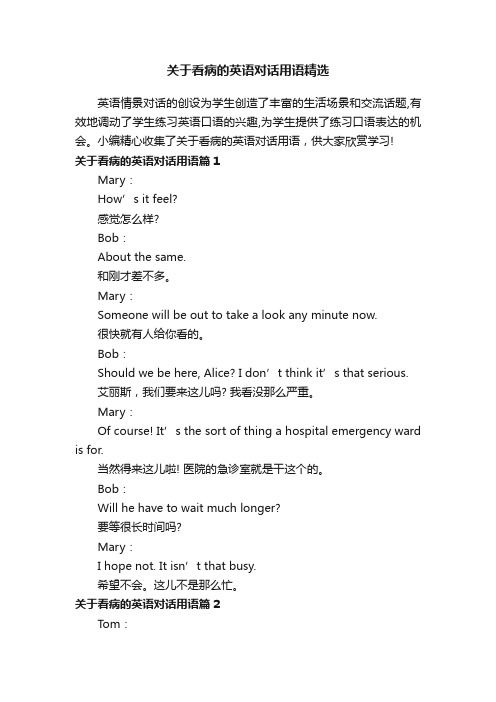
关于看病的英语对话用语精选英语情景对话的创设为学生创造了丰富的生活场景和交流话题,有效地调动了学生练习英语口语的兴趣,为学生提供了练习口语表达的机会。
小编精心收集了关于看病的英语对话用语,供大家欣赏学习!关于看病的英语对话用语篇1Mary:How’s it feel?感觉怎么样?Bob:About the same.和刚才差不多。
Mary:Someone will be out to take a look any minute now.很快就有人给你看的。
Bob:Should we be here, Alice? I don’t think it’s that serious.艾丽斯,我们要来这儿吗? 我看没那么严重。
Mary:Of course! It’s the sort of thing a hospital emergency ward is for.当然得来这儿啦! 医院的急诊室就是干这个的。
Bob:Will he have to wait much longer?要等很长时间吗?Mary:I hope not. It isn’t that busy.希望不会。
这儿不是那么忙。
关于看病的英语对话用语篇2Tom:Hi, Jane, you are a different person now. How's it going?嗨,简。
你现在跟以前不一样了。
最近怎么样?Jane:The training is useful, and I learned much about how to keep fit.训练很有用。
我学到了很多关于保持健康的知识。
Tom:Really? Tell me about it. You know, I haven't been to the club for a long time because of the busy work..真的吗?跟我说说。
[六年级英语]看病常用词汇及句型
![[六年级英语]看病常用词汇及句型](https://img.taocdn.com/s3/m/578bf23c866fb84ae55c8d2c.png)
看病常用词汇及句型词汇:1.doctor 医生2.physician 内科医生3.surgeon 外科医生4.dentist 牙医5.psychologist 心理医生6.surgery 外科手术,手术室7.nurse 护士8.symptom 症状9.pill 药丸10.tablet 药片11.capsule 胶囊12.eyedrops 眼药水13.vitamin 维他命14.penicillin 盘尼西林15.aspirin 阿司匹林16.antibiotic 抗生素17.injection 注射18.bandage 绷带19.stethoscope 听诊器20.extract 拔牙词组:1. have a cold/fever/cough 感冒,发烧,咳嗽2. have a stomach ache/sore throat/stuffed nose 胃疼,喉咙疼,鼻塞3. feel dizzy/chilly 感到头晕,感到发冷4. throw up 呕吐5. take one's temperature 量体温6. see a doctor 看病7. send for a doctor 请医生8. feel one's pulse 量脉搏9. take one's blood pressure 量血压10. give a prescription 开药方11. have an operation 动手术12. make an appointment 预约13. stay in bed 卧床休息14. case history 病历15. pass out 晕倒常用句型:1.You look pale./You don’t look well.2.I feel sick/awful/bad.3.I don’t feel well.4.She had a throbbing pain 2 hours ago.5.I have watery eyes and running nose.6.Do you have a high temperature?7.The doctor ordered him to stay in bed.8.You must hospitalize.9.You should take medicine in time.10.Do you have any symptoms?11.Could you describe your symptoms?12.How is your appetite? / Do you have any appetite?13.How about your appetite? / How has your appetite been?14.I don't have any appetite. / I don't have much of an appetite these days.15.I have no appetite. / I don't feel like eating anything.16.How long has it been this way?17.I'll give you some medicine. / I'll give you a prescription.18.You'd better stay in bed for a few days. / Please stay in bed for a few days.19.I'll take your advice. / I'll follow your suggestions.20.You should probably have an X-ray.。
看医生英语三种表达方式
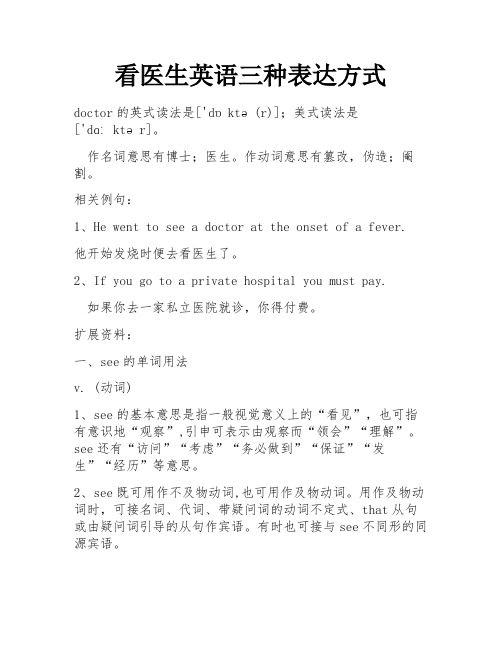
看医生英语三种表达方式doctor的英式读法是['dɒktə(r)];美式读法是['dɑːktər]。
作名词意思有博士;医生。
作动词意思有篡改,伪造;阉割。
相关例句:1、He went to see a doctor at the onset of a fever.他开始发烧时便去看医生了。
2、If you go to a private hospital you must pay.如果你去一家私立医院就诊,你得付费。
扩展资料:一、see的单词用法v. (动词)1、see的基本意思是指一般视觉意义上的“看见”,也可指有意识地“观察”,引申可表示由观察而“领会”“理解”。
see还有“访问”“考虑”“务必做到”“保证”“发生”“经历”等意思。
2、see既可用作不及物动词,也可用作及物动词。
用作及物动词时,可接名词、代词、带疑问词的动词不定式、that从句或由疑问词引导的从句作宾语。
有时也可接与see不同形的同源宾语。
3、“see+量词+of”表示看见某人的频率。
see more of sb 是固定习语,意为“较多地见到”, more可换用little, quite a lot, much less, a great deal等表示相应的意义。
二、consult的单词用法v. (动词)1、consult的基本意思是为了作出一项决定、取得一项解决办法而进行对话或讨论。
可以是单向的,即“请教”“咨询”; 也可以是双向的,即“商议”“商量”。
无论是“咨询”还是“商量”,双方地位都是平等的。
引申可以表示向书本咨询,即“翻阅”“查考”资料,也可以表示向自己咨询,即“考虑”“顾及”。
2、consult可用作不及物动词,也可用作及物动词。
作“请教”解时多接人作宾语;作“翻阅”解时常接书、词典、地图等作宾语; 作“考虑”解时其宾语多为抽象名词。
表示“与…商量”可接介词with;表示请教或商议的一般内容可接介词about,重大或特殊内容则接介词on;而接介词for时则表示“为…当顾问”。
看病的英语短语和词汇
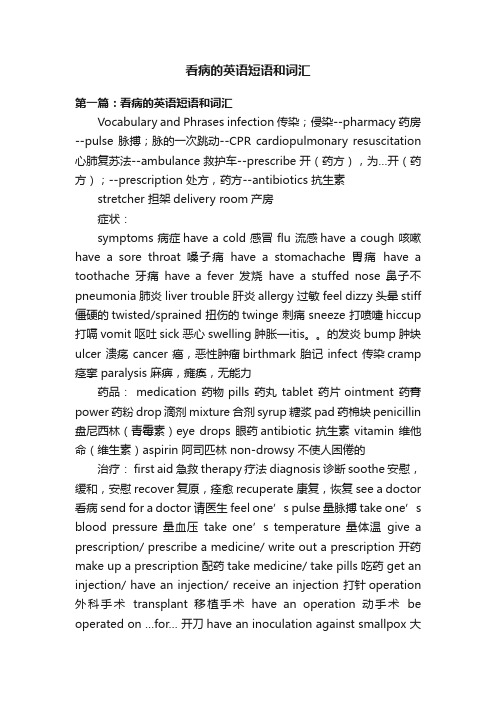
看病的英语短语和词汇第一篇:看病的英语短语和词汇Vocabulary and Phrases infection 传染;侵染--pharmacy 药房--pulse 脉搏;脉的一次跳动--CPR cardiopulmonary resuscitation 心肺复苏法--ambulance 救护车--prescribe 开(药方),为…开(药方);--prescription 处方,药方--antibiotics 抗生素stretcher 担架delivery room产房症状:symptoms 病症have a cold 感冒 flu 流感have a cough 咳嗽have a sore throat 嗓子痛have a stomachache 胃痛have a toothache 牙痛have a fever 发烧have a stuffed nose 鼻子不pneumonia 肺炎 liver trouble 肝炎allergy 过敏 feel dizzy 头晕stiff 僵硬的twisted/sprained 扭伤的twinge 刺痛 sneeze 打喷嚏hiccup 打嗝 vomit 呕吐sick 恶心 swelling 肿胀—itis。
的发炎 bump 肿块ulcer 溃疡 cancer 癌,恶性肿瘤birthmark 胎记 infect 传染cramp 痉挛 paralysis 麻痹,瘫痪,无能力药品:medication 药物pills 药丸tablet 药片ointment 药膏power 药粉drop 滴剂 mixture 合剂syrup 糖浆 pad 药棉块penicillin 盘尼西林(青霉素)eye drops 眼药antibiotic 抗生素 vitamin 维他命(维生素)aspirin 阿司匹林 non-drowsy 不使人困倦的治疗: first aid 急救therapy 疗法 diagnosis 诊断soothe 安慰,缓和,安慰 recover 复原,痊愈recuperate 康复,恢复 see a doctor 看病send for a doctor 请医生feel one’s pu lse 量脉搏take one’s blood pressure 量血压take one’s temperature 量体温give a prescription/ prescribe a medicine/ write out a prescription 开药make up a prescription 配药take medicine/ take pills 吃药 get an injection/ have an injection/ receive an injection 打针operation 外科手术transplant 移植手术have an operation 动手术be operated on …for… 开刀have an inoculation against smallpox 大天花疫苗 dose 给。
去医院看病的英语口语对话
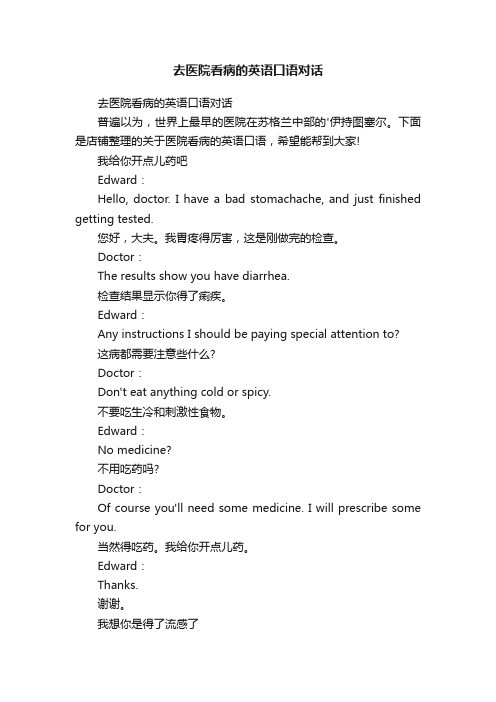
去医院看病的英语口语对话去医院看病的英语口语对话普遍以为,世界上最早的医院在苏格兰中部的'伊持图塞尔。
下面是店铺整理的关于医院看病的英语口语,希望能帮到大家!我给你开点儿药吧Edward:Hello, doctor. I have a bad stomachache, and just finished getting tested.您好,大夫。
我胃疼得厉害,这是刚做完的检查。
Doctor:The results show you have diarrhea.检查结果显示你得了痢疾。
Edward:Any instructions I should be paying special attention to?这病都需要注意些什么?Doctor:Don't eat anything cold or spicy.不要吃生冷和刺激性食物。
Edward:No medicine?不用吃药吗?Doctor:Of course you'll need some medicine. I will prescribe some for you.当然得吃药。
我给你开点儿药。
Edward:Thanks.谢谢。
我想你是得了流感了Mary:I have a sore throat and my chest hurts.我的喉咙发炎,胸口疼。
Doctor:How long have you been like this?这样有多久了?Mary:Two or three days now.有两三天了。
Doctor:I think you've got the flu. There's a lot of it going around. 我想你是得了流感。
现在流感盛行。
Mary:What do you think I ought to do?你认为我应该怎么办呢?Doctor:Get this prescription filled and go straight to bed.拿这张药方去配药,然后马上去睡觉。
最新医院看病时常用的英语口语表达

【篇一】医院看病时常用的英语口语表达1、一般病情He feels headache,nausea and vomiting.他觉得头痛、恶心和想吐。
He is under the weather.他不舒服,生病了。
He began to feel unusually tired.他感到反常的疲倦?He feels light-headed.他觉得头晕。
She has been shut-in for a few days.她生病在家几天了。
Her head is pounding.她头痛。
His symptoms include loss of appetite,weight loss,excessive fatigue,fever and chills.他的症状有食欲和体重减轻、非常疲倦、发烧和发冷。
He feels exhausted or fatigued most of the time.他大部份时间都觉得非常疲倦。
He has been lacking in energy for some time.他感到虚弱有段时间了。
He feels drowsy,dizzy and nauseated.他觉得昏昏欲睡,头晕目眩和想吐。
He feels as though everything around him is spinning.他感到周围的东西都在打转。
He has noticed some loss of hearing.他发觉耞力差些。
She has some pains and itching around her eyes.她眼睛四周又痛又痒。
2、伤风感冒He has been coughing up rusty or greenish-yellow phlegm. 他咳嗽带有绿黄色的痰。
His eyes feel itchy and he has been sneezing.他眼睛发痒,而且一直在打喷嚏。
有关看病的英语口语表达

【导语】虽然医院这个地⽅⼤家都想避⽽远之,但⼜⼏乎不太可能,有时候我们还需要陪他⼈⼀块去医院看病,今天由给⼤家分享了看病的英语⼝语表达,赶紧来看看吧!【篇⼀】看病的英语⼝语表达 1.Is it serious?我的病严重吗? 2.Is it good news?是好消息吗? 3.Do I need to be hospitalized?我需要住院吗? 4.Am I going to need surgery?我需要做⼿术吗? 5.You're not in the clear yet.现在还不清楚。
6.You'll be seeing Dr Andy.Andy医⽣会接待你。
7.I'm afraid the prognosis isn't good.恐怕结果不是很好。
8.You have a long road to recovery.你需要很长时间来恢复。
9.How long have I been in the hospital?我在医院待多久了? 10.We'll know more after a few days.过⼏天我们就会知道更多。
11.When will the tests results come in?检查结果什么时候出来? 12.We're running 2 hour behind schedule.我们会延长营业2⼩时。
13.The doctor is not taking new patients now.医⽣现在不收新病⼈。
14.Your test results came in this afternoon.你的检查结果今天下午出来了。
15.We'll let you know if there are any cancellations.如果有⼈取消预约,我们会通知你。
【篇⼆】看病情景实⽤英语⼝语对话 A.You must know you've been scheduled to have an operation the day after 您⼀定知道,您的⼿术安排在后天。
英语中的看病用语

英语中的看病用语英语中的看病用语本单元语法-------看病用语看病需要和医生交流,这是英语口语中必不可少的内容。
从医生询问病情,病人诉说病情,到医生检查、诊断和医嘱,这些环节最常用的语句,同学们必须掌握。
一、医生询问病情的常用语句1. What’s wrong/the matter (with you)? 你怎么了?What's your trouble, young man? 年轻人,你哪里不舒服?When did it start? 从何时开始生病的?2. How are you (feeling) now? 你现在觉得怎么样?Are you feeling better today? 你今天好些了吗?3. Have you got a headache/a cough? 你头痛/咳嗽吗?4. When did you feel unwell? 你什么时候觉得不舒服的?5. When did the pain start? 疼痛何时开始的?6. Did you sleep well? 你睡得好吗?Do you feel tired? 你觉得疲劳吗?7. How long have you been like this? 你像这样有多久了?8. Did you eat anything for breakfast? 你早饭吃些东西了吗?二、病人诉说病情的常用语句1. I don't feel very well. / I'm not feeling well. 我感到不舒服。
2. I have (got) a headache. 我头痛。
I have a sore throat. 我嗓子痛。
I have a backache. / I have a pain in my back. 我后背痛。
There's something wrong with my leg. 我的腿有毛病了。
有关看病的英文表达方法

有关看病的英文表达方法下面是店铺整理的有关看病的英文表达方法,欢迎大家阅读!Disease是指影响身体机能的非正常情况,即我们通常说的疾病。
Medical condition也常用来指疾病。
在英文中,广义上Disease也包括外伤(injury)、残疾(disability)、紊乱(disorder)、综合症(syndrome)、感染(infection)以及非正常行为(deviant behavior)等。
非正常情况主要与symptoms和signs有关。
Symptom是指病人自己主观感觉到的不正常情况。
它可以是慢性的(chronic)、复发的(relapsing)或者缓解的(remitting)。
它可以恶化(worsen)或者逐步改善(become better或者convalesce)。
疾病可以是有症状的(symptomatic)或者是无症状的(asymptomatic)。
Constitutional或者general症状是影响全身的,而不是仅仅影响某个器官或者部位。
患者主述称为chief complaint、presenting symptom或者presenting complaint,它指病人看病的原因。
而最终导致诊断(diagnosis)的症状称为主要症状(cardinal symptom)。
Sign是医生或者其他人观察到的某种事实或者特征。
Medical sign是医生在体检(physical examination)过程中发现的某种医学事实或者特征。
当然也可能医生与病人都注意到了某种状况,那么它可以既是symptom也是sign。
比如,疼痛(pain)只能是symptom,因为医生无法感受到病人的疼痛。
而血细胞数量值只能是sign,因为病人无法感知。
不要混淆sign和indication,后者是使用某种治疗方法的根据,在中文中似乎也翻译为症状。
对临床症状的解释是症状学(semiotics)。
美联英语:医学英语常见就诊、病情表达口语

美联英语提供:美联英语: 医学英语常见就诊、病情表达口语导学:在学习医学英语时,必不可少的就是懂一些就诊时的口语表达,这是医生和患者之间沟通的渠道,只有这样才能更好看病,下面就和美联小编一起来了解一下医学英语-医生经常使用的就诊医学口语吧1. Let me take a look in your ears first. 首先,让我看一下你的耳朵。
2. Now let me examine your nose. 现在让我检查你的鼻子。
3. Look right at me,please. 请看着我。
4. Now open your mouth. 现在张开你的嘴。
5. Open it just as wide as you can. 尽量把嘴张大。
6. I'm not going to do anything to hurt you. 我不会使你感到疼痛。
7. Lift your tongue up to the roof of your mouth. 把你的舌头抬到上腭。
8. Now let your tongue down. 现在把你的舌头放下来。
9. Just breathe easily through your mouth. 只用嘴轻轻地呼吸。
10. Please say,"Ah". 请说“啊”。
11. Now I want to look in your throat with my mirror. 现在我要用喉镜检查你的咽喉。
12. Would you come toward me just a little?稍向我靠近一点好吗?13. Stick your tongue way out. 把你的舌头伸出来。
14. Look at the ceiling. 看天花板。
15. What's the matter?什么事?16. What's your complaint?什么病?17. What can I do for you?我能为你效劳吗?18. Is there anything wrong?有什么不对劲吗?19. What exactly is wrong?到底有什么不对劲呢?20. What symptoms do you have?你有什么症状?21. Is there anything particularly unusual?有什么特别不一样的吗?22. What's the trouble?什么毛病?23. When did it happen?是什么时候发生的?24. Since when has it hurt?受伤多久了?25. Since when?从什么时候?26. When did this start?从什么时候开始的?27. When did you start having this problem?你从什么时候开始有这毛病的?28. When did this trouble start?这毛病是从什么时候开始的?29. How long has it been bothering you?这困扰你有多久了?30. Do you have a fever?你发烧吗?31. Do you have a cold?你着凉了吗?32. Do you have severe headaches?你头痛得厉害吗?33. Do you have a sore throat?你喉咙痛吗?34. Do you feel chilly?你觉得冷吗?35. Do you feel nauseous?你想吐吗?36. Do you have diarrhea?你拉痢疾吗?37. Have you ever coughed up blood or bloody phlegm?你曾咳出血或痰中带血吗?38. Have you passed blood in your urine?你小便带血吗?39. Are you taking any medicine regularly?你通常吃什么药吗?40. Do you have any allergies?你有什么过敏反应吗?41. How is your appetite?你食欲如何?42. Do you often drink alcohol?你常喝酒吗?43. Can you walk?你能走路吗?医学英语-一些常见病情的英语表达1. He feels headache, nausea and vomiting.他觉得头痛、恶心和想吐。
日常英语口语医院看病Hospital

日常英语口语:医院看病Hospital挂号常用的句子:Where shall I register? 我应该在哪儿挂号?Where is the registration office? 挂号处在哪儿?How can I register? 我怎么挂号呢?Please wait on line to register. 请站队等候挂号。
Please line up for register. 请排队挂号。
Please queue up to register. 请排队挂号。
Many people are lining up for registration. 许多人在排队挂号。
A great many of people are waiting on line to register. 好多的人在排队等候挂号。
Is it for emergency case? 是看急诊吗?Do you want to have an emergency treatment? 你要看急诊吗?Are you asking for an emergency case? 你要看急诊吗?I want to get specialist treatment. 我要看专家治疗。
I would like to get a specialist for care. 我想看专家门诊。
I wonder whether I could register with expert service. 我想知道我能否挂专家门诊。
How much do I need pay for the registration? 我需要付多少挂号费?How much are you going to charge me for the registration. 你要向我收取多少挂号费。
The registration fee is 5 yuan. 挂号费五元。
就诊常用英语

就诊常用英语人病了,就要去医院看病,那么医生在给人看病时需要用上的口语,你都知道吗?下面是小编为您收集整理的就诊常用英语,供大家参考!就诊常用英语(1) 一般病情:He feels headache, nausea and vomiting. (他觉得头痛、恶心和想吐。
)He is under the weather. (他不舒服,生病了。
)He began to feel unusually tired. (他感到反常的疲倦。
)He feels light-headed. (他觉得头晕。
)She has been shut-in for a few days. (她生病在家几天了。
)Her head is pounding. (她头痛。
)His symptoms include loss of appetite,weight loss,excessive fatigue, fever and chills. (他的症状包括没有食欲、体重减轻、非常疲倦、发烧和发冷。
)He feels exhausted or fatigued most of the time. (他大部份时间都觉得非常疲倦。
)He has been lacking in energy for some time. (他感到虚弱有段时间了。
)He feels drowsy, dizzy and nauseated. (他觉得昏昏欲睡,头晕目眩和想吐。
)He feels as though everything around him is spinning. (他感到周围的东西都在打转。
)He has noticed some loss of hearing. (他发觉听力差些。
)She has some pains and itching around her eyes. (她眼睛四周又痛又痒。
)(2) 伤风感冒:He has been coughing up rusty or greenish-yellow phlegm.(他咳嗽带有绿黄色的痰。
看病常用英语

内容简介一、看病常用英语护士:早上好!Nurse: Good morning.病人:你好!Patient: Good morning.护士:请问哪里不舒服?Nurse: What seems to be the problem?病人:高烧,感觉糟透了。
Patient: Im running a high fever and feeling terribly bad.护士:这种情况出现有多久了?Nurse: How long have you had the problem?病人:从昨晚开始的。
Patient: Since last night.护士:您以前来过咱们医院吗?Nurse: Well, have you ever been here before?病人:事实上,我也是刚刚到这个城市。
Patient: As a matter of fact, I have just moved to this city.护士:好的,那么您得先填写这张挂号表。
比如您的年龄,挂号,住址等等。
Nurse: O. K. In that case, you have to fill in this registration card. Your age, gender, address and things like that.病人:每问题。
请问我应该挂哪科?Patient: No problem. Which department should I register with, madam?护士:您最好挂内科。
Nurse: You'd better go to the medical department.病人:表填好,给你。
Patient: Here is my registration card.护士:谢谢。
挂号费是一美圆。
Nurse: Thank you. The registration fee is one dollar.,病人:好的。
- 1、下载文档前请自行甄别文档内容的完整性,平台不提供额外的编辑、内容补充、找答案等附加服务。
- 2、"仅部分预览"的文档,不可在线预览部分如存在完整性等问题,可反馈申请退款(可完整预览的文档不适用该条件!)。
- 3、如文档侵犯您的权益,请联系客服反馈,我们会尽快为您处理(人工客服工作时间:9:00-18:30)。
有关看病的英文表达方法
Disease是指影响身体机能的非正常情况,即我们通常说的疾病。
Medical condition也常用来指疾病。
在英文中,广义上Disease也包括外伤(injury)、残疾(disability)、紊乱(disorder)、综合症(syndrome)、感染(infection)以及非正常行为(deviant behavior)等。
非正常情况主要与symptoms和signs有关。
Symptom是指病人自己主观感觉到的不正常情况。
它可以是慢性的(chronic)、复发的(relapsing)或者缓解的(remitting)。
它可以恶化(worsen)或者逐步改善(become better或者convalesce)。
疾病可以是有症状的(symptomatic)或者是无症状的(asymptomatic)。
Constitutional或者general症状是影响全身的,而不是仅仅影响某个器官或者部位。
患者主述称为chief complaint、presenting symptom或者presenting complaint,它指病人看病的原因。
而最终导致诊断(diagnosis)的症状称为主要症状(cardinal symptom)。
Sign是医生或者其他人观察到的某种事实或者特征。
Medical sign是医生在体检(physical examination)过程中发现的某种医学事实或者特征。
当然也可能医生与病人都注意到了某种状况,那么它可以既是symptom 也是sign。
比如,疼痛(pain)只能是symptom,因为医生无法感受到病人的疼痛。
而血细胞数量值只能是sign,因为病人无法感知。
不要混淆sign和indication,后者是使用某种治疗方法的根据,在中文中似乎也翻译为症状。
对临床症状的解释是症状学(semiotics)。
医生的检查检验通常称为test。
Healthy是指身体、精神及社会活动方面都健全,而illness指所有无法达到这一标准的状况。
Illness也叫ill-health或者ail。
Health care 指通过医疗、护理及相关职业来预防、治疗和管理疾病并确保身心健康。
在当今社会,patient的同义词是health consumer或者health care consumer;它往往是政府机构、保险公司和患者团体的用语。
急诊状况是medical emergency,而急诊部门是emergency department或者emergency ward。
Drug是食物和器械之外的任何影响生物体机能的化学物质。
它除了治疗疾病,还能改变行为或者改变精神状态以带来愉悦。
Medications通常是医药公司的具有专利的产品。
不受专利权保护的药品是generic drugs。
Medicine的含义是通过检查、诊断和治疗来维持和恢复患者的健康,通常翻译为医学。
它也有药品的含义。
广义上,它包括任何医学专业,但是在医学界,medicine(不需要手术)和surgery(需要手术)构成两大专业。
Medical doctor、medical practitioner或者physician是医生的统称,需要注册并持有执照。
而其中medical practitioner是最容易理解、最中性的字眼。
它包括了专科医生(medical specialist)和一般医生(general practitioner),如家庭医生。
历史上它曾包括内科医生(physician)、外科医生(surgeon) 以及药师(pharmacist)。
单独用doctor指医生可能与其他学科的‘博士’相混淆;doctor在拉丁文中是‘老师’的意思。
doctor of medicine或者medical doctor是医生的准确名称。
在北美,physician的含义和doctor of medicine一样。
但在北美以
外,它主要被翻译为‘内科医生’,与外科医生相对。
这是该词的传统含义,主要强调通过使用药物而不是通过手术来治疗病人。
在美国,与这个意义对应的同义词是internist。
但无论在欧洲还是北美,physician and surgeon都是一个对医生的尊称,无论何种专业领域。
美国和加拿大的医学委员会(medical board)用这个短语来指称任何医生。
护理人员(nurse practitioner)不能称为physician。
临床医师是clinician。
Resident physician或者resident是住院医生。
也叫做house officer。
他们必须从经过认证的医学院毕业并获得相应的学位。
第一年的住院医生也叫intern,即实习生。
实习期或者实习身份叫internship。
他在一个合格的physician指导下在医院(hospital)或者诊所(clinic)从事医生的工作。
在这个阶段完成之后,他也可能有一个fellowship时期,专门研究某个细分的医学领域。
在大多数国家,住院医生阶段(residency)通常是成为合格医生所必须经过的过程。
通过了这个阶段的医生叫attending physician、attending或者consultant。
Charlatan是达不到标准,只为了获得利润而行医的人。
古罗马人有个词叫archiater,是宫廷医生(court physician),比较接近中文‘太医’的含义,诊断并治疗后,或者诊断后不治疗就离开的患者叫outpatient(门诊患者),而住院治疗的患者叫inpatient。
入院叫to be admitted。
医院称为hospital,通常提供住院治疗;诊所称为clinic,通常只接受门诊患者,比医院规模小。
Hospital和hotel同源;而clinic和incline
同源,因为病人历史上是斜躺在床上接受治疗的。
注意,在使用hospital这个单词时,美国和其他英语国家不一样,通常需要一个冠词。
如,in the hospital;但在英国及其他国家,in hospital。
